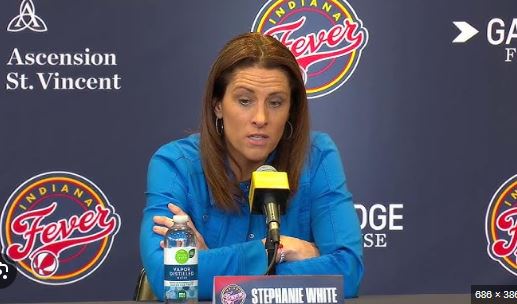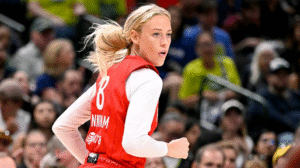
In the world of professional women’s basketball, few players have been as vocal and uncompromising in their advocacy as Indiana Fever guard-forward Sophie Cunningham. A seasoned athlete who transitioned to the Fever after spending six years with the Phoenix Mercury, Cunningham has emerged not just as a contributor on the court, but also as a bold spokesperson for player rights and league accountability. Her recent interactions with media and her use of social media platforms to call out what she sees as shortcomings in the WNBA have drawn widespread attention—both supportive and critical.

Speaking Up and Calling Out
Cunningham’s candor became headline material again when she was asked to weigh in on the ongoing debate over the length of the WNBA season. Rather than diving into scheduling logistics, she used the opportunity to spotlight what she considers a more urgent issue: fair compensation for players. “You can just tell Cathy to pay us, and then we can have a discussion,” she responded bluntly, referencing WNBA Commissioner Cathy Engelbert. With that statement, she joined a chorus of players who are demanding better financial recognition for their contributions to the league, especially as negotiations for a new collective bargaining agreement (CBA) continue.
The remark was in step with a larger sentiment that has been building across the league. At the recent WNBA All-Star Weekend, players donned shirts emblazoned with the phrase “Pay Us What You Owe Us,” sending a loud and clear message to league officials and fans alike. Although Cunningham wasn’t selected for the All-Star roster, she has been every bit as active in pushing the conversation forward through other platforms—most notably TikTok and X (formerly Twitter).
TikTok, Fines, and Controversy
Cunningham revealed in a recent post that a TikTok video of hers had earned her a $500 fine from the league. The video itself, while seemingly lighthearted, featured her lip-syncing to pop artist Sabrina Carpenter’s lyrics: “Manchild. Stupid. Or is it slow? Maybe, it’s useless.” She captioned the post with “@ some refs,” clearly targeting WNBA officiating. Although humorous on the surface, the video was a pointed critique of what Cunningham perceives as poor refereeing and lack of player protection—issues she has been increasingly vocal about.
After revealing the fine, Cunningham took to X and posted: “I got fined $500 for this TikTok 😂😂😂 [I don’t know] why this is funny to me…like ok 👍 you got it bud! Cause there’s not more important things to be worried about with our league right now.” The statement implied that she believes the league’s priorities are misplaced, focusing more on penalizing players for minor infractions than addressing systemic problems such as compensation inequities and officiating concerns.
Protecting Caitlin Clark—and Taking on the Enforcer Role
Cunningham’s recent activism is deeply intertwined with her defense of Fever teammate Caitlin Clark, one of the league’s most high-profile rookies. Clark has been at the center of a media frenzy since entering the league, bringing not just viewership but also intense scrutiny. As a result, she’s been targeted on the court—something Cunningham has not taken lightly.
One incident in particular showcased Cunningham’s intense commitment to her teammate. During a matchup with the Connecticut Sun, Clark was poked in the eye by Sun guard Jacy Sheldon. The play was perceived by many as overly aggressive, if not outright dirty. As tensions rose, Cunningham stepped in, confronting Sheldon in a moment that escalated into a physical altercation. Both players were ejected with just 40 seconds left in the game.
Reflecting on the moment later, Cunningham didn’t hold back. “During that, it was just part of the game. I think the refs had a lot to do with that,” she said. She went on to suggest that the officiating problems in the league are not new. “It was a build-up for a couple years now of them just not protecting the star player of the WNBA. At the end of the day, I’m going to protect my teammates. That’s what I do.”
This wasn’t the first time Cunningham had spoken out about what she views as a lack of institutional support for star players. In her eyes, referees and league officials have failed to create a safe and fair environment, especially for players like Clark who command a significant amount of attention.
A Growing Voice on and Off the Court
Cunningham’s fiery persona has been gaining traction among fans and critics alike. Since joining the Indiana Fever, she has cultivated a growing social media following, surpassing a million followers on TikTok. This digital reach has made her an influential voice, capable of shaping narratives and generating discussion well beyond the hardwood.
On the court, she has been a steady contributor for the Fever. Over 19 games this season, including two starts, she’s averaged 7.3 points, 4.1 rebounds, and has connected on 40% of her three-point attempts—all in an average of 23.5 minutes per game off the bench. While those numbers may not jump off the stat sheet, her impact goes beyond raw statistics. She brings leadership, grit, and a willingness to do the dirty work—whether that means taking a charge or stepping into a fight to defend a teammate.
Cunningham’s Role Within the Fever
Cunningham has embraced the role of enforcer on a young Fever team looking to establish an identity. With rising stars like Caitlin Clark drawing significant attention from opponents and media alike, Cunningham has assumed responsibility for making sure her teammates feel supported and protected. Her willingness to speak out against officials, accept fines, and physically defend teammates has made her an emotional anchor for the team.
Her actions have sparked debate about what kind of tone the Fever are setting as a franchise. Are they becoming too aggressive, or are they simply demanding respect? Whatever the answer, Cunningham has become central to that narrative, not afraid to play the villain if it means standing up for her teammates and her beliefs.
The Bigger Picture: WNBA Players Demanding Change
Cunningham’s activism is part of a larger movement within the WNBA. The league is currently engaged in CBA negotiations with the players’ union, and financial compensation is one of the core issues on the table. Many players have openly discussed the need for increased salaries, better travel accommodations, and overall investment in the league’s infrastructure. The conversation has grown louder in recent months as players realize the growing visibility and popularity of women’s basketball offers a unique opportunity to push for meaningful change.
The phrase “Pay Us What You Owe Us” has become a rallying cry, seen not just on T-shirts but echoed in interviews and social media posts by players across the league. It’s a demand not just for fair pay, but for respect and recognition.
Cunningham’s statements—about player protection, fines, officiating, and league priorities—reflect this broader climate of frustration and aspiration. Her willingness to call out perceived injustices in public forums has made her both a lightning rod and a leader, earning admiration from some corners and criticism from others.
A New Era of Player Empowerment
This season may well mark a turning point in how WNBA players engage with fans, the media, and league leadership. Cunningham represents a new archetype of player—one who isn’t content to “shut up and dribble.” Instead, she’s leveraging her platform to push boundaries and challenge the status quo.
As social media continues to blur the lines between professional and personal, and as younger fans increasingly engage with athletes on platforms like TikTok and Instagram, players like Cunningham are redefining what it means to be a professional athlete. They are entertainers, activists, influencers, and competitors—all rolled into one.
Cunningham’s recent $500 fine, while small in the grand scheme of professional sports, is symbolic of the tension between players and league leadership. It raises questions about how much freedom athletes truly have to speak their minds, and whether the league is listening to the very voices that are elevating its profile.
Looking Ahead: What Will Change?
With the CBA negotiations ongoing, Cunningham’s remarks—and the conversations they spark—could prove influential. The league has already made strides in recent years, including chartered flights for back-to-back games and a revamped playoff format. But players are signaling that more change is needed, and they’re no longer willing to stay silent.
As for Cunningham, her mix of toughness on the court and unfiltered honesty off of it ensures that she will continue to be a key figure in these discussions. Whether she’s taking a stand for a teammate, calling out a referee, or poking fun at the league on TikTok, she’s doing so with a purpose.
She may not have been an All-Star this season, but make no mistake—Sophie Cunningham is one of the most impactful voices in the WNBA today. And if her recent actions are any indication, she’s just getting started.
Leave a Reply